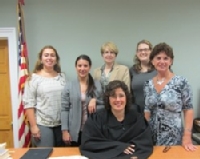Program Gives Students Experience and Shoplifters Second Chance

Shoplifting often begins on a dare and ends with problems that persist long after the exhilaration of obtaining a “five-finger discount” has faded. What many thrill-seeking teens and young adults don't know is that shoplifting is a summary offense, which means fingerprinting if convicted. Once those fingerprints enter “the system,” they linger in databases that future employers use for background checks. Failing a background check dashes any hope of working around children or in a school system and sometimes in health care. It means the person can't get the “clearances” they need to even be placed in an internship. In this respect, indulging a whim to swipe a $5 lip gloss can have lifelong economic repercussions.
District Magistrate Judge Alyce Hailstone Farrell presides over the district court that covers central and east Scranton (the Hill Section). Justice Farrell was concerned that young shoplifting offenders would be haunted for years by one moment of stupidity and might destroy future career goals over items as inconsequential as beef jerky. “I was seeing a lot of women who had to apply for a pardon because they had a summary retail offense on their record and needed it removed for job reasons. But a pardon is hard to get and the wait is really long. Having this offense on a record keeps students from pursuing many careers – nursing, teaching, law enforcement,” Justice Farrell said.
So she and Judge Chester Harhut, who oversees Lackawanna County’s 11 district judges, teamed with The University of Scranton's Debra Pellegrino, Ed.D., dean of the Panuska College of Professional Studies, and Gerianne Barber, director of the counselor training center, to institute a shoplifting intervention program meant to give these offenders a second chance.
First-time offenders who are either between the ages of 15 to 22 may be eligible for the program. When such offenders come before Justice Farrell, she gives them a choice: complete the six-week program at the University and have your record expunged or take your chances at a hearing.
Barber supervises graduates students in running the six-week program aimed at restoring a youthful offender's clean record. She said the University has offered the group counseling program each semester since the fall of 2009. University graduate students have facilitated the program’s group sessions for as few as five and as many as 10 young people.
Barber accompanies her graduate students to Justice Farrell's hearings. There, if the young person chooses the program in hopes of an expunged record, Scranton graduate students conduct an “intake interview.”
“I am so impressed by the University and the students,” Justice Farrell said of the intake interviews. “Geri Barber and her students know just what to ask and how to ask it. They get these kids to really open up, so they are really ready for the program even before they begin it.”
“The shoplifting intervention program benefits both counseling students and the offenders," said Tracie Hallock, a graduate student who will complete her master’s in rehabilitation counseling in December. “It was a great hands-on use of skills we learned in the classroom. Also, the diversity of the program amazed me. Each participant had a different background, different underlying reasons for their behavior. For something that seems like a simple offense, there's so much complexity beneath it.”
Not every offender is eligible for the program. Barber said things like a previous arrest, violent behavior or gang activity will keep a person out of the group counseling. Once accepted, the person begins a six-week journey into exploring his or her behavior, identifying stressors and replacing self-defeating behavior with “accountability, responsibility and empowerment.” The counselors have been very successful in this regard. Justice Farrell said that they've had just one person re-offend after going through the program, “And that was for underage drinking, not retail theft,” she said.
“We are trying to move them to an empowered place where good decisions are being made,” Prof. Barber said. “I think many people we counsel come in with the idea that, 'I'm going to be lectured to,' but that's not what this is. It's self-reflection and growth. That's what I like about this program. We use it as a jump-off to other behaviors. The entry is shoplifting, but in the end it's about coping mechanisms.”